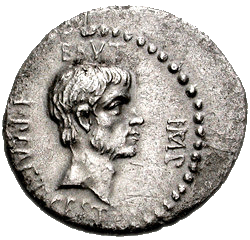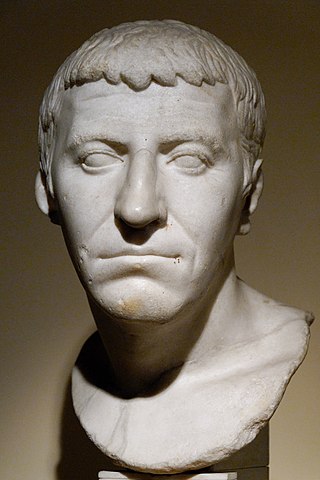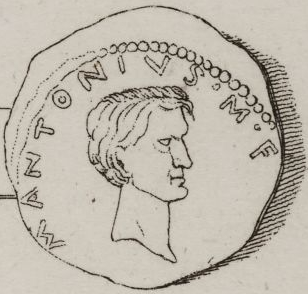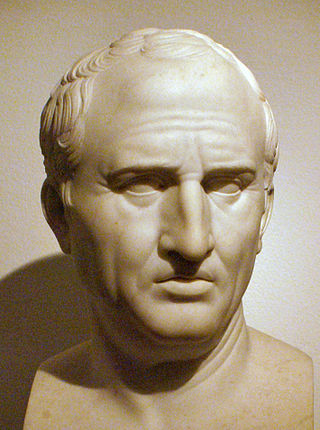Related Research Articles

The Battle of Actium was a naval battle fought between Octavian's maritime fleet, led by Marcus Agrippa, and the combined fleets of both Mark Antony and Cleopatra. The battle took place on 2 September 31 BC in the Ionian Sea, near the former Roman colony of Actium, Greece, and was the climax of over a decade of rivalry between Octavian and Antony.

Marcus Antonius, commonly known in English as Mark Antony, was a Roman politician and general who played a critical role in the transformation of the Roman Republic from a constitutional republic into the autocratic Roman Empire.

This article concerns the period 49 BC – 40 BC.

Marcus Junius Brutus was a Roman politician, orator, and the most famous of the assassins of Julius Caesar. After being adopted by a relative, he used the name Quintus Servilius Caepio Brutus, which was retained as his legal name. He is often referred to simply as Brutus.

Year 42 BC was either a common year starting on Monday, Tuesday or Wednesday or a leap year starting on Tuesday of the Julian calendar and a common year starting on Tuesday of the Proleptic Julian calendar. At the time, it was known as the Year of the Consulship of Lepidus and Plancus. The denomination 42 BC for this year has been used since the early medieval period, when the Anno Domini calendar era became the prevalent method in Europe for naming years.

The Second Triumvirate was an extraordinary commission and magistracy created at the end of the Roman republic for Mark Antony, Lepidus, and Octavian to give them practically absolute power. It was formally constituted by law on 27 November 43 BC with a term of five years; it was renewed in 37 BC for another five years before expiring in 32 BC. Constituted by the lex Titia, the triumvirs were given broad powers to make or repeal legislation, issue judicial punishments without due process or right of appeal, and appoint all other magistrates. The triumvirs also split the Roman world into three sets of provinces.

The Battle of Philippi was the final battle in the Liberators' civil war between the forces of Mark Antony and Octavian and the leaders of Julius Caesar's assassination, Brutus and Cassius, in 42 BC, at Philippi in Macedonia. The Second Triumvirate declared the civil war ostensibly to avenge Julius Caesar's assassination in 44 BC, but the underlying cause was a long-brewing conflict between the Optimates and the Populares.

Alexander Helios was a Ptolemaic prince and son of Pharaoh Cleopatra VII of the Ptolemaic dynasty and Roman triumvir Mark Antony. Alexander's fraternal twin sister was Cleopatra Selene II. Cleopatra named her son after Alexander the Great. His second name in Ancient Greek means "Sun"; this was the counterpart of his twin sister's second name Selene (Σελήνη), meaning "Moon".
Ptolemy Philadelphus was a Ptolemaic prince and was the youngest and fourth child of Greek Ptolemaic Queen Cleopatra VII of Egypt, and her third with Roman Triumvir Mark Antony.

Gaius Cassius Longinus was a Roman senator and general best known as a leading instigator of the plot to assassinate Julius Caesar on 15 March 44 BC. He was the brother-in-law of Brutus, another leader of the conspiracy. He commanded troops with Brutus during the Battle of Philippi against the combined forces of Mark Antony and Octavian, Caesar's former supporters, and committed suicide after being defeated by Mark Antony.

Sextus Pompeius Magnus Pius, also known in English as Sextus Pompey, was a Roman military leader who, throughout his life, upheld the cause of his father, Pompey the Great, against Julius Caesar and his supporters during the last civil wars of the Roman Republic.

Marcus Antonius Antyllus was a son of the Roman Triumvir Marc Antony. He was also called Antyllus, a nickname given to him by his father meaning "the Archer". Despite his three children by Cleopatra, Marc Antony designated Antyllus as his official heir, a requirement under Roman law and a designation that probably contributed to his execution at age 17 by Octavian.
Lucius Pinarius Scarpus was a Roman who lived during the late Republic and the early Empire. He served as the Roman governor of Cyrene, Libya during the War of Actium. He was originally loyal to Mark Antony, but eventually switched sides and joined Octavian following the latter's victory at the Battle of Actium in 31 BC.

The Battle of Mutina took place on 21 April 43 BC between the forces loyal to the Senate under consuls Gaius Vibius Pansa and Aulus Hirtius, supported by the forces of Caesar Octavian, versus the forces of Mark Antony which were besieging the troops of Decimus Brutus. The latter, one of Caesar's assassins, held the city of Mutina in Cisalpine Gaul.
Lucius Cornificius, a member of the plebeian gens Cornificia, was a Roman politician and consul in 35 BC.

The Liberators' civil war was started by the Second Triumvirate to avenge Julius Caesar's assassination. The war was fought by the forces of Mark Antony and Octavian against the forces of Caesar's assassins, led by Marcus Junius Brutus and Gaius Cassius Longinus, referred to as the Liberatores. The latter were defeated by the Triumvirs at the Battle of Philippi in October 42 BC, and committed suicide. Brutus committed suicide after the second part of the battle.

Julius Caesar was assassinated by a group of senators on the Ides of March of 44 BC during a meeting of the Senate at the Curia of Pompey of the Theatre of Pompey in Rome where the senators stabbed Caesar 23 times. They claimed to be acting over fears that Caesar's unprecedented concentration of power during his dictatorship was undermining the Roman Republic. At least 60 to 70 senators were party to the conspiracy, led by Marcus Junius Brutus, Gaius Cassius Longinus, and Decimus Junius Brutus Albinus. Despite the death of Caesar, the conspirators were unable to restore the institutions of the Republic. The ramifications of the assassination led to his martyrdom, the Liberators' civil war and ultimately to the Principate period of the Roman Empire.

The personal life of Marcus Tullius Cicero provided the underpinnings of one of the most significant politicians of the Roman Republic. Cicero, a Roman statesman, lawyer, political theorist, philosopher, and Roman constitutionalist, played a critical role in the transformation of the Roman Republic into the Roman Empire. A contemporary of Julius Caesar, Cicero is widely considered one of Rome's greatest orators and prose stylists.
Marcus Favonius was a Roman politician during the period of the fall of the Roman Republic. He is noted for his imitation of Cato the Younger, his espousal of the Cynic philosophy, and for his appearance as the Poet in William Shakespeare's play Julius Caesar.
The tomb of Antony and Cleopatra is the undiscovered burial crypt of Mark Antony and Cleopatra VII from 30 BC assumed to be located in Alexandria, Egypt. According to historians Suetonius and Plutarch, the Roman leader Octavian permitted their burial together after he had defeated them. Their surviving children were taken to Rome, to be raised as Roman citizens. The Egyptian Ministry of Tourism and Antiquities believes that it is in or near a temple of Taposiris Magna, southwest of Alexandria.
References
- ↑ Caelius Aurelianus, De morbis acutis et chronicis 3.14
- ↑ Plutarch, Brutus 100.41
- 1 2 3 4 Leith, David (2020). "Notes on three Asclepiadean doctors". In Totelin, Laurence; Flemming, Rebecca (eds.). Medicine and Markets in the Graeco-Roman World and Beyond: Essays on Ancient Medicine in Honour of Vivian Nutton. Classical Press of Wales. pp. 128–134. ISBN 9781910589908 . Retrieved 2024-03-29.
- 1 2 Barca, Natale (2023). Before Augustus: The Collapse of the Roman Republic. Casemate Publishers. p. 319. ISBN 9781636242330 . Retrieved 2024-03-29.
- ↑ Dunglison, Robley (1872). History of Medicine from the Earliest Ages to the Commencement of the Nineteenth Century. Lindsay and Blakiston. p. 157. Retrieved 2024-03-29.
- ↑ Velleius Paterculus, Roman History 2.70
- ↑ Lactantius, The Divine Institutes 2.8; D. C. 47.41
- ↑ Valerius Maximus, Factorum et dictorum memorabilium libri IX 1.7.1
- ↑ Tertullian, De Anima 100.46
- ↑ Suetonius, The Twelve Caesars , "Augustus" 100.91
- ↑ Appian, The Civil Wars 4.110
- ↑ Florus, Epitome of Roman History 4.7
- ↑ Israelowich, Ido (2016). "Medical Care in the Roman Army during the High Empire". In Harris, William V. (ed.). Popular Medicine in Graeco-Roman Antiquity: Explorations. Brill Publishers. pp. 245–246. ISBN 9789004326040 . Retrieved 2024-03-29.
- ↑ Jerome, Chronicon
- ↑ Clement of Alexandria, Paedagogus 2.2, p. 153
![]() This article incorporates text from a publication now in the public domain : Greenhill, William Alexander (1870). "M. Artorius". In Smith, William (ed.). Dictionary of Greek and Roman Biography and Mythology . Vol. 1. p. 378.
This article incorporates text from a publication now in the public domain : Greenhill, William Alexander (1870). "M. Artorius". In Smith, William (ed.). Dictionary of Greek and Roman Biography and Mythology . Vol. 1. p. 378.